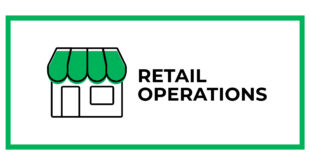 In the July issue of Hardware Retailing magazine, we discuss the succession planning process for the entering generation in the article, “Stepping In.” In the story, we share best practices and real-life examples from retailers who have gone through or are currently tackling succession planning. Now, we want to provide a different perspective from someone who’s dedicated his life to helping family businesses. Wayne Rivers, co-founder and president of the Family Business Institute, sat down with Hardware Retailing to share his thoughts and expertise on handling transitional planning for the family business.
In the July issue of Hardware Retailing magazine, we discuss the succession planning process for the entering generation in the article, “Stepping In.” In the story, we share best practices and real-life examples from retailers who have gone through or are currently tackling succession planning. Now, we want to provide a different perspective from someone who’s dedicated his life to helping family businesses. Wayne Rivers, co-founder and president of the Family Business Institute, sat down with Hardware Retailing to share his thoughts and expertise on handling transitional planning for the family business.
Hardware Retailing (HR): How did you discover the need for the Family Business Institute? What inspired you to pursue this line of work?
Wayne Rivers (WR): It was completely by accident. I was working for a bank and doing financial planning, and it was painfully apparent that well over half of the plans we put in place never got implemented. I heard things like, “Well, I don’t get along with my son and daughter, so I don’t know if we’re going to continue this family business.” So we said, what’s the problem here? And the problem was a lack of common vision, a lack of communication, lack of healthy ability to converse, no conflict resolution skills and an avoidance of topics that might spark conflict. We saw dysfunction in the family business was clearly a problem, and not so much the fact that they didn’t have good future financial plans. We saw a market niche and created this company 27 years ago.
HR: What does the Family Business Institute do?
WR: We do succession planning for family businesses, which covers management and ownership planning. We also do long-term strategic planning with family businesses. Business owners tend to get so bogged down in the day-to-day activities of operating their companies that they really don’t have the luxury of time to stop and think about where they’ll be in three, 10 or 25 years. We help them create that future vision and put together a strategy that will allow them to get there successfully. A lot of times, family business owners end up trapped by their own success, so we work on various things to create freedom for them and help them realize their entrepreneurial dreams.
HR: What is the biggest challenges families face during succession planning?
WR: They don’t know how to plan. Things come up in business all the time that we’re used to dealing with. For example, a computer crashes. It’s a problem, but it’s happened before and we know who to call and what to do. But when it comes to succession, this only happens once a generation. So the succession muscles typically atrophy. You’ve managed to get through Granddad’s departure, but that was 25 years ago. Now Dad wants to get out, and he wants his son to facilitate that, but where do they begin? The biggest problem is the how-to part. How do you go about ownership succession? How do you go about management succession? How do you go about aligning visions for what this company will look like during the transition period? I had a young man say to me one time that his dad lets him run about 75 percent of the company, but the problem was that any given day Dad walked through the door, he didn’t know which 25 percent he was going to operate. That’s a huge transition problem. Parents spend less and less time at the business, but in their own minds, their authority doesn’t diminish. So they walk in the door and shake up the things that the successor generation has been working on for the last five weeks.
HR: What is the best way for families to handle disputes related to the business?
WR: The short answer is that they should hire a firm like mine. They have to dig deep in their hearts, and the first thing they have to do is create time to think about future. It doesn’t have to be days and weeks; it could be a breakfast every other week to seriously dig into these issues. The second thing they have to do is figure out their vision for the business. Do you want growth? And if not growth in revenue, then growth in efficiency or growth in customer satisfaction? What are you going to need five years from now to continue to be successful? The change cycle is ever shortening, so you have to reinvent your businesses more and more often. Coming together on a common vision for what the business is going to look like in five or 10 years is a tall order. If you don’t have a common vision, none of the other plans you create will make a difference.
HR: Are there any other steps families can take to prevent disagreements or problems throughout the succession planning process?
WR: No, you can’t prevent them. What you need is a system for resolving the problems amicably. It’s not an issue of whether or not problems are going to arise; they are. The issue is figuring out what you’re going to do once they arise. How are we going to converse with each other? What are your ground rules for talking to each other? How do we go about resolving conflicts when they occur? Two people are never going to agree on everything and then when you put it in the family, you might have 10, 15 or 20 people involved. If you can’t get two people to agree on something, how will you get 20 to align? You need a plan so that once disagreements arise, you can deal with them in a way that doesn’t destroy the bonds of family.
HR: For a young retailer who’s transitioning into ownership, what should he or she be considering and what questions should that person be asking? What’s the younger generation’s role in this process?
WR: Their role better be to look objectively at the future of the business and how they’ll pay off mom and dad. Mom and dad operated the business for years with very little debt, and now you have to buy the business or property from them. That means you’re going to be operating while servicing debt, which they never had to do. Where’s the money going to come from? If you’re marginally profitable and have to pay mom and dad’s salary or benefits or other things, where is the money going to come from? If they’re not there contributing every day, that can be a big cost. In some cases, CPAs and attorneys work for mom and dad. They see the business is worth $1 million, so they’ll try to have the entering generation pay $100,000 per year for 10 years to buy the parents out. Well, nobody ever looks at future cash flow projection, nobody looks at pro forma income statements to see if paying out $100,000 a year for people who don’t work there anymore is even feasible. It’s so important to consider those things.
HR: Now, let’s talk about the owner who’s transitioning out of the business. What’s their outlook? What should their prospective be as they’re leaving in order to make the transaction successful?
WR: They should be doing everything they can to leave the business in as healthy of a condition as possible, financially, operationally, from a human resources point of view. The typical family company is usually very dependent on Mom and Dad for a host of things. What can happen is that Mom and Dad say, ‘OK, junior, we’re leaving, so you’re going to continue to do your job, which takes 60 hours per week, and you’re doing our job now, too, and you’ll need to pay us $100,000 per year.’ And that’s not fair. Prior to their departure, Mom and Dad need to hire the right people. They need to make sure everything is in place so that when they transition into retirement, the company continues to operate without missing a beat. Too often there’s a huge vacuum when the parents leave, because the children are doing their old jobs and doing their parents’ old jobs, too. They have no idea what they’ve gotten themselves into.
HR: What can both sides do to work together? If the two sides aren’t on the same page, how do they find harmony?
WR: You have to find that same page that everybody can agree on. There’s no way everyone will agree on every single thing, but you have to come up with something. There’s never a magic solution. You usually have to take a little from column A, a little from column B and a little from column C, and piece together a solution. What you really need to do is take a step back and be as objective as possible, looking at the needs of the business first. Business-first families are much more successful than family-first families. You need to put the infrastructure in place to keep the business healthy, and that will allow everybody to get some of what they want in the future. If the business goes away, Mom and Dad don’t get their million bucks, son and daughter are out of jobs and lots of other people are out of jobs, too. That’s lose, lose, lose.
HR: How do you recommend families address tough topics, like money?
WR: Twenty-seven years ago, there wasn’t a lot of literature about family businesses out there. But now, I’ve written four books; there are lots of other people who’ve written books. There’s a Family Business Magazine. There are all kinds of resources out there. You can get a pretty good education in the basics of family business just by researching and doing some reading. Your other typical advisors, lawyers and CPAs, are of some help and can sometimes be reasonably sensitive when it comes to family business issues. But, the most help comes from other family business. If I were running a retail hardware store in Michigan, I’d be looking at my network of other hardware stores in the state that I know from trade shows, conventions and people that are members of my buying group, and I’d be really interested in talking to them. Those people have hands-on, real-life experience that’s of immense value, and they’re probably willing to give it to you for free. If they have excellent documentation from their lawyers or if they have excellent planning templates or something like that, most of the time people are willing to share, verbally, very freely. They’re willing to give tips and share their experience. Getting that peer feedback is invaluable.
HR: What should the family do when one side is unwilling to cooperate and will not compromise?
WR: That comes down to the No. 1 ingredient in family business succession success, and that’s reasonableness. If you have a mom, dad, sister or brother who’s absolutely unreasonable, you’ll never be able to work with them. For example, if everybody says the business is worth $1 million, but one person insists that their share alone is worth $5 million, your opinions are too far apart, and you’ll never agree. If there’s a key player in the group who’s unreasonable, you’d better be looking for an alternative. Maybe you look for another job, or another business opportunity. When we encounter families with one or more people who are absolutely unreasonable, there’s really not much you can do about it. If you see that, don’t wait until you’re 55 years old to figure out you’re dealing with an unreasonable person. You need to diagnose that when you’re 35 years old and still have lots of opportunities in life. Don’t stay in a sick, dysfunctional family business situation where one person dominates simply by being difficult. If you do that, you’re making your bed.
HR: What are some key identifiers of successful ownership transition in a family business?
WR: The planning has begun well in advance of the senior generation’s departure. Communication is frequently scheduled, regular and healthy. The finances of the business are very well-understood by all parties. Generally, moms and dads understand the finances of their businesses pretty well, because they’ve had to live with them over the past 20 or 30 years. But oftentimes finances are the last thing the entering generation is introduced to in the succession process, and that’s a huge mistake. I’m not talking about accounting, or compliance finance. I’m talking about managerial finance. What defines the finances of a healthy business versus an unhealthy one, that sort of thing. Now, the most important part of a successful transition may be having the right people in place. Without the right people in place, it doesn’t matter how successful the business has been, what your balance sheet looks like, that Mom and Dad are terrific and perfectly willing to hand over control. Without the right people in place, it’s not going to work.
HR: And what are some signs that the transition didn’t, or isn’t going to, go well?
WR: The trouble is easy to spot. There’s friction, dysfunction and a lack of trust. One of the ways to diagnose lack of trust is lack of eye contact. When you sit in a meeting with family members and they can’t look each other in the eye or they’re speaking through me as a third party, “Tell my dad this,” or “Tell my son that,” that stuff is easy to diagnose. You can see it, and sometimes you can feel it. When things aren’t going well, the tension in the room is so thick. You can look at the financials, and those often speak for themself. You’ll see ratios are out of balance, and they have way too much debt relative to their equity in the company. Or, compensation for family members is way too high for the size of business. In one case, I remember looking into one small family business’s financials, and they were paying thousands of dollars per year for lawyers and CPAs. They weren’t in a lawsuit. How could you possibly be spending six figures a year on this? Basically, their advisers were really taking advantage of them. Unhealthiness is a lot easier to spot, and it’s a lot more frequent, unfortunately.
HR: Why do some family businesses fail to make it past first- or second-generation ownership?
WR: The deck is stacked against them. Third- and fourth-generation owners should be proud. It’s important to realize past performance is no guarantee of future success. Just because Mom and Dad transitioned it and Grandma and Grandpa transitioned it doesn’t mean you’re going to get it right in your generation. Do not get complacent. One of the things I see frequently, even in well-run family businesses, is complacency. They’ve been bringing in money for years, and everyone’s rich. For example, we have a client now who wants to meet to begin working on some family stuff, but they can never meet because they’re too busy enjoying the luxuries of success. They don’t want to be bothering with business matters. They’re filthy rich, incredibly successful, and have a great company that run almost on auto-pilot, but that stinks of complacency to me. They’re not willing to roll up their sleeves and work on their main project, which is the family. When you’re working with a family, momentum is so critical. It’s like an NFL game—whoever has the momentum has the upper hand. Some folks don’t understand the value of momentum.
HR: Aside from Family Business Institute services, are there any other types of professional services that you recommend families look into while succession planning?
WR: There are lots of firms like mine out there now, and there were not 27 years ago. Ninety-five percent of family business consultants are one-man shops, which is fine. If you can find a good consultant to help you, that’s great. A good resource is the Family Firm Institute. It’s an international learning trade organization, and they publish various magazines and online publications and provide forums for families to come together and have meetings and learn. Family Business Magazine is a good resource, too.
 Hardware Retailing The Industry's Source for Insights and Information
Hardware Retailing The Industry's Source for Insights and Information








